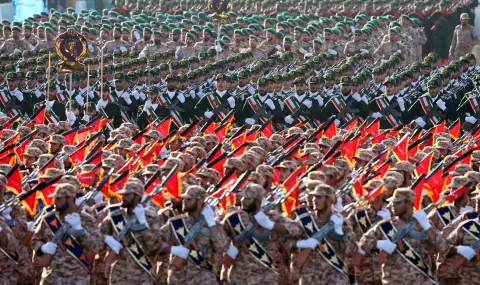In the midst of regional escalation caused by the war in Gaza and its expansion into Lebanon, Iraq is trying not to intervenes in the conflict, but at the same time has to deal with local pro-Iranian armed factions hostile to Israel, reports AFP, writes BTA.
These factions, known as the “Islamic Resistance in Iraq”, have repeatedly claimed responsibility for drone attacks on Israeli targets in solidarity with Palestinians in the Gaza Strip, who have been embroiled in a deadly war between Israel and the radical Palestinian movement “Hamas“.
On October 4, Israel reported the death of two soldiers in an attack carried out by Iraq. The next day, Israeli Prime Minister Benjamin Netanyahu declared that his country was defending itself on "seven fronts", including that of the "Shiite militias in Iraq".
Since then, Baghdad has stepped up its diplomatic efforts to prevent the war from spreading to the rest of the country.
What worries the Iraqi government is its “obvious inability to control the situation inside the country and its inability to prevent external consequences”, analyst Sajjad Jiyad points out.
Last Sunday, Iraqi National Security Adviser Qassem al-Aaraji told Al Arabiya television channel that Baghdad was conducting "official and unofficial contacts to protect the country" while facing "internal and external pressure to de-escalation“.
„Only the government decides on war and peace, and Iraq has no intention of entering into a conflict that could have serious consequences,”, he added.
The government of Iraqi Prime Minister Mohammed Shia al-Sudani, supported by the Coordination Framework - a pro-Iranian coalition, also seeks to maintain a balance in its relations with Tehran and Washington.
A source close to pro-Iranian factions told AFP that officials from the Coordination Framework recently met with “several factional leaders”, assuring them that attacks on Israel risked exposing Iraq to airstrikes.< /p>
According to the same source, factional leaders have asked the government not to intervene, saying they are ready to bear the consequences.
Last Monday, Abu Hussein al-Hamidawi, secretary-general of the Hezbollah Brigades, an influential pro-Iranian armed group in Iraq, called on the "Islamic resistance to prepare for the possibility of prolonging this war and continue." to attack Israel.
On the eve of the anniversary of the war in Gaza, which was triggered on October 7, 2023 by an attack by the Palestinian movement “Hamas” against Israel, As Sudani said Baghdad had “worked intensively to spare Iraq”, calling for a “redoubled effort” to avoid a devastating war in the region.
According to Sajjad Jiyad, Baghdad's attempt to “lighten the situation through dialogue” is complicated by the fact that “there is no real interlocutor”, even more so that “the US firmly supports Israel”.
The researcher from the International Institute “Centuries“ in New York warns that Baghdad “could be forced to support a military response” if Israel “decides to step up its strikes, targeting, for example, Iraq's oil infrastructure”. That is why Baghdad seeks to “avoid this situation”, he adds.
In addition to Israel, in recent months Iraqi factions have attacked bases in Iraq and Syria that house US troops. Washington retaliated with airstrikes against factional positions in both countries.
The United States maintains about 2,500 troops in Iraq and 900 in Syria as part of the international coalition formed in 2014 to fight the jihadist group “Islamic State” (ID).
The factions are demanding the withdrawal of American troops. Washington and Baghdad have announced that the coalition's military mission will end within a year.
After Tehran launched a missile attack on Israel on October 1, the Iraqi Resistance Coordination Framework threatened to attack “all US bases and interests in Iraq and the region” if the “Zionist enemy” used Iraqi airspace to attack Iran. Social media sites linked to pro-Iranian Iraqi armed factions welcomed the Iranian attack on Israel, Reuters said.
Pro-Iranian factions also threaten the Persian Gulf countries. On October 7, the general secretary of the brigades “Syed ash Shuhada“ Abu Alaa al-Walai said that Israel is bombing Gaza and the southern suburbs of Beirut with “the United Arab Emirates (UAE) and Saudi Arabia”.
However, according to military expert Munkid Dagger, the balance of power between pro-Iranian groups and Israel and the US is “entirely in favor of the latter”.
The two allies have “intelligence and technology superiority, as well as air superiority”.
Iraqi groups lead above all “media“ battle, he says, because they “know the limits of their military capabilities”.
